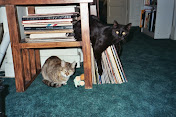Eventually, my brother and I shared a house as adults and -- like magic -- there were suddenly six cats running the place. One of them was addled and liked to sit on the speed bump in the street. If we heard honking and cussing, we knew where she was.
My husband and I have had two cat duos. The first consisted of Sammie (named Sammie Jeanne after his mother) and Magic, who jumped into my car in the courthouse parking lot and would not leave. Sammie was friendly to my husband and would crawl under the covers to sleep with him.
 |
| Sammie and Magic |
After those two, we had Stella and Phoebe, both rescues who joined us in 2005. Stella crossed the rainbow bridge in 2020, and Phoebe, toothless for a decade, still rules our lives. I've decided black cats are especially smart, and Stella was my girl.
We moved several times, so I would walk them on leashes until they knew the new neighborhood. People remember you when you do that. Even unleashed, the cats would follow us on walks, assuming if we were going somewhere they should, too.
Humans tend to anthropomorphize their animals. A.K.A. assume they have human qualities. That's why we talk to them. If they tilt their heads certain ways when we ask a question, we assume a certain response. Some answers are obvious. If you ask a dog if she wants to go outside and she sits, she doesn't want to go potty in the rain.
Pets in our Books
Why am I talking about pets in a blog that is mostly about writing? I like to put them in stories. My characters are generally sleuths who live alone. They need company. It's weird to talk to the furniture.
Pets can be a distraction, though that's not the best use in fiction. Mostly, I think they root a character in their place. S/he has to care for them; it matters if she gets home in time to let the dog out or feed the cat. The latter would have a place to potty but would knock things off the tables if ignored.
In a mystery series, a pet can be the constant in sleuth's life. In my Jolie Gentil series, which takes place at the Jersey shore, her black cat, Jazz, always has a role. So much so that she's on the cover of every book. Usually, she's simply asserting her place in Jolie's life, but she has been known to attack someone trying to harm Jolie.
 |
| Stella and Phoebe prevent writing |
In the River's Edge series, set in rural Iowa, Mr. Tibbs crawls into Melanie's life in the first book. He's actually a female, but the prior owner had selected the male name, and it stuck. An example of a pet that provides humor.
In my mystery books, pets don't think for themselves (other than sensing danger and reacting to it). I'm not big on pets that communicate with their owners -- telepathically or otherwise. However, the Mildred Mistletoe holiday stories are told from a cat's point of view (a black cat, of course). Those are a lot of fun to write.
At the moment, I'm constructing a "who does what and has what role" page for the newest Jolie book. I realized I have no role ascribed to Jazz. If I add her to my thinking sheet, she could have more opportunities to shine. Or at least pester Jolie for treats.
* * * * *
To learn more about Elaine, visit her website or sign up for her newsletter.
